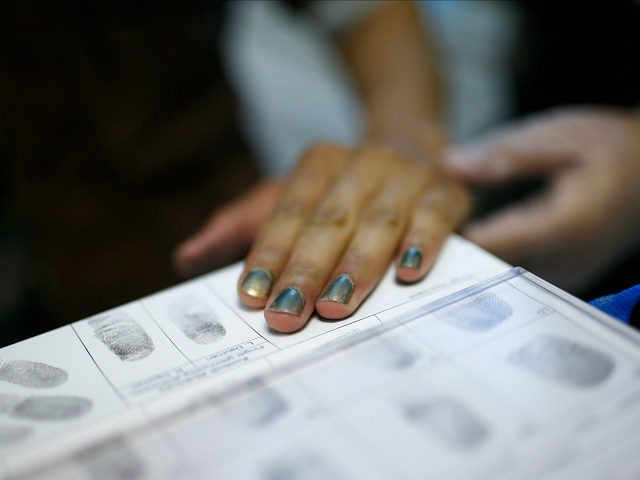China is expected to soon require all foreigners ages 14 to 70 to provide their fingerprints upon entering the communist country, a move allegedly aimed at strengthening national security.
In a statement, China’s Ministry of Public Security revealed that “the information would then be stored for official use, the statement said. It did not elaborate on whether the information would be shared across ministries and other government agencies,” reports the South China Morning Post.
“Storing biological identification information of people entering and leaving borders is an important border control measure, and many countries have started to implement the regulation,” also said the ministry, adding, “Authorities will ensure that the new system is efficient and does not result in unnecessary delays.”
Under the new measure, Chinese officials will begin collecting fingerprints at Shenzhen’s airport on Friday, among other locations, notes the Morning Post, adding that Beijing plans to expand the requirement to entry points across the nation gradually.
Foreigners traveling on diplomatic passports and visas will not be required to provide their fingerprints.
Citing an unnamed Shenzhen border authority official, the Morning Post explains that individuals from Hong Kong, Macau, and Taiwan will not be considered foreigners under the directive.
Hong Kong and Macau are considered Special Administrative Regions of China with a supposedly high degree of autonomy.
Although China considers Taiwan a breakaway province, the democratic island thinks of itself as being independent of China’s Communist Party control.
To enter China, citizens from Hong Kong, Macau, and Taiwan use Beijing-issued “home return permits” rather than Chinese passports like other foreigners, notes the Morning Post.
Some of the countries that already collect biometric data from foreigners include the United States, Britain, France, Japan, and Australia.
The U.S. began collecting fingerprints from foreign nationals ages 14 to 79 in 2004, in response to the September 11, 2001, terrorist attacks on the American homeland.
In a report to Congress last year, the U.S.-China Economic and Security Review Commission revealed that China is facing a growing Islamic terrorism threat from its ally and neighbor Pakistan.
Islamic terrorist activities, primarily stemming from Pakistan and to a lesser extent Afghanistan, “have become more frequent and high profile,” noted the report, adding that China appears primarily concerned about the “Islamization” of Pakistan’s military.
The commission noted, referring to Andrew Small, senior transatlantic fellow at the German Marshall Fund of the United States:
According to one expert, the inability or unwillingness of Islamabad to eradicate Pakistan-linked terror threats against Chinese targets is leading some Chinese analysts to conclude that the creeping “Islamization” of the Pakistani armed forces (particularly ISI) it has long supported is beginning to undermine China’s strategic interests.
ISI refers to Pakistan’s Inter-Services Intelligence agency.
The autonomous Chinese province of Xinjiang, home to the country’s largest concentration of the Muslim Uighur minority, borders Pakistan-occupied Kashmir and neighboring Afghanistan.
“As the threat of extremism and terrorism facing China grows, counterterrorism has become an increasingly important facet of Beijing’s engagement with South Asia. Chinese leaders have for decades been concerned about Islamic extremism and terrorism in Xinjiang, China’s westernmost region and home to the majority of China’s Uighurs, a mostly Muslim ethnic group,” pointed out the commission.

COMMENTS
Please let us know if you're having issues with commenting.